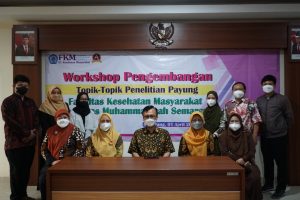
Semarang | Unimus (January 29, 2018) ‘Together we enhance nutrition towards healthy and high-achieving society’ still becomes the focus of the 58th National Nutrition Day celebration on January 25, 2018. The reason why the theme was chosen was due to the high number of malnutrition suffered by Indonesian people. One of the indicators could be seen in the high number of malnutrition in Indonesian children, in accordance with the threshold determined by the World Health Organization (WHO).
Committed to improving the quality of nutrition of Indonesian people and in accordance with the commemoration of 58th nutrition day, Nutrition Science Study Program of the Faculty of Nursing and Health Sciences at Universitas Muhammadiyah Semarang (Unimus) in collaboration with the Indonesian Nutrition Association (INA) for Central Java Province just held a series of events since January 25, 2018. The agenda included education and nutritional counseling week, banner installation, and sticker distribution. The peak activity was a green walk in Simpang Lima (five-way intersection) area, Semarang. Yuliana Nur Setiawati Ulvie, S.Gz., M.Sc., the committee chairperson, stated that topic of the event in the counseling week was “Stunting Prevention with Nutritional Counseling and the Healthy Living Community Movement (Gerakan Masyarakat Hidup Sehat/Germas). Nowadays, the recent development of nutritional care for stunting, under-nutrition and over-nutrition hasn’t been encouraging. The prevalence of under-nutrition, especially stunting and micro under-nutrition is still high; meanwhile, over-nutrition cases have begun to increase. Several major factors causing stunting and other nutritional problems in the first 1000 days of life include knowledge, parenting, and economy,” she revealed.
The nutritional counseling is given to educate pregnant women and women having 0 to 24 month-old babies, especially those with nutritional and other health problems in Semarang Municipality,” asserted the committee chairman, who also becomes the secretary of Nutrition Science Study Program at Unimus. Targets of the nutritional counseling were children identified short and thin (based on the monitoring data of nutritional status from the Health Office of Semarang), pregnant women, and women having 0-24 month-old babies (based on data from Integrated Services Post (Posyandu)),working women in some industrial area nearby the counseling location, and people with other nutritional problems. Lecturers and students of Nutrition Science Study Program at Unimus took part in the event.
Reported by the Technical Unit of Public Relations and Protocol
![]()




